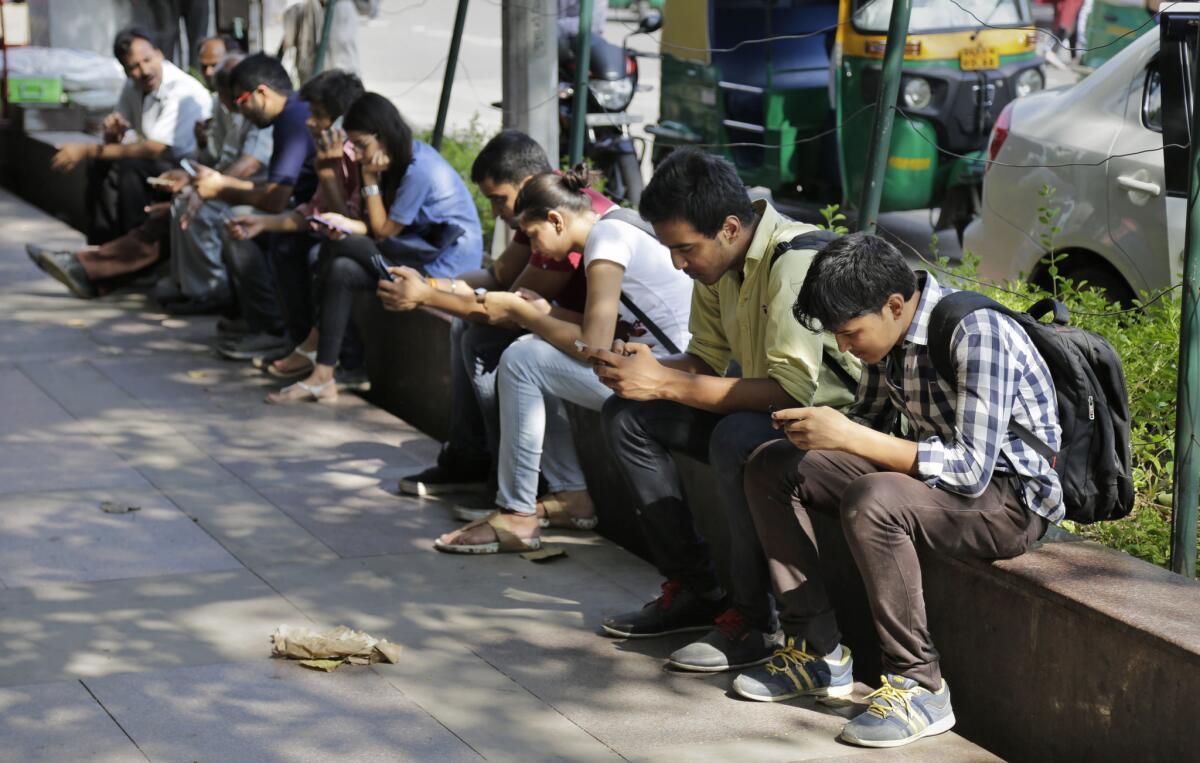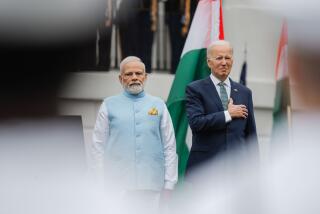Indians are wary of Mark Zuckerberg’s free Internet

Indians use their mobile phones in New Delhi on Sept. 22.
Reporting from Mumbai, India — The highly touted “town hall” encounter between Indian Prime Minister Narendra Modi and Facebook founder Mark Zuckerberg in Menlo Park, Calif., on Sunday turned out to be a predictable affair, even after the famously macho Indian leader choked up talking about his poor upbringing.
Adding to the scripted feel of the event at Facebook headquarters was the first question posed to Modi, from Vir Kashyap, co-founder of Babajob.com. The relatively obscure job-search website is a partner of Internet.org, Zuckerberg’s initiative to bring free Internet service to impoverished Indians.
That Babajob.com – and not a more established player – got such exposure added to the grumbling about Internet.org, which many Indian analysts and tech industry leaders say is an attempt by Zuckerberg’s behemoth company to corral unsuspecting users into a Facebook-controlled cage on the edge of the World Wide Web.
At first blush, Internet.org hardly sounds like a nefarious project: extending Internet access to those who’ve never had it or can’t afford it, in part by offering limited packages of Internet service free of charge, and without ads.
In India, while more than 8 million are gaining Internet access every month, more than 800 million people are still without it, according to industry figures. With Facebook under constant pressure to show it can grow beyond its 1.5 billion worldwide users, India represents a potential gold mine – which perhaps explains why Zuckerberg has aggressively courted Modi since the Indian leader took office in May 2014.
More than 800,000 people have signed up for a steadily growing package of websites offered in India through Facebook’s partner, Reliance Communications, a second-tier mobile provider hoping to boost its market share. In all, Facebook says, more than 1 billion people have access to its free services in 19 countries in Asia, Africa and Latin America.
But the initiative has sparked more controversy than Zuckerberg expected.
Critics say the project violates “net neutrality” – the principle that Internet service providers should not prioritize traffic flow to certain websites – and hinders consumer choice by pre-selecting a suite of websites (including Facebook, of course) and blocking others.
They also say that Facebook, by routing all online traffic through its partners, will be able to vacuum up data about its users. The company also grants itself rights to whatever images, videos and other content people post on the platform.
The most vocal opponents say Facebook effectively would create an online caste system: An unfettered, more secure Internet for those who can afford to pay for their connections, and a smaller, less private world for others.
“It’s creating two levels of society on the Internet where different people have different levels of access to information,” said Nikhil Pahwa, an editor at Medianama.com, a website that covers the digital industry in India and has been highly critical of the project.
NEWSLETTER: Get the day’s top headlines from Times Editor Davan Maharaj >>
Earlier this year, several major Indian companies said they would opt out of Internet.org over net neutrality and privacy concerns.
Facebook asked the travel website Cleartrip.com to join Internet.org because its online train-booking service was likely to attract rural Indians, said the company’s founder, Hrush Bhatt. But Bhatt said the company withdrew from the initiative because of discomfort with the idea that a corporation would select what sites Internet users see and how fast they see them.
Bhatt and others say that if Facebook wanted to expand Internet access for Indians, there were other ways of doing it without violating net neutrality. In some African countries, telecommunications providers have bundled data plans in with the purchase of new handsets. In Bangladesh, users get a certain amount of free data by watching ads.
Only 20% of Internet.org users in India were accessing the Internet for the first time, according to Facebook data – meaning that most users were switching from other providers due to cost.
“It’s disingenuous for Facebook to do this in the name of providing connectivity,” Bhatt said. “If they really want to provide connectivity, why not give out phones or provide subsidies for data plans?”
In response to the opposition, Facebook last week announced a few changes to the initiative, including a new name, Free Basics, to differentiate the suite of free services from the broader project to increase Internet access. The company also said it would encrypt more of the information transmitted by users, a key privacy concern.
“The program is making an impact on people’s lives by providing free health, education, and economic information,” the company said.
Follow @SBengali for news from South Asia.
ALSO
Fighting rages in Afghan city of Kunduz; Taliban raises flag
With Syria policy in tatters, Obama may relax stance on Assad
In Turkey’s restive southeast, slayings of 2 Kurdish teens raise questions
More to Read
Sign up for Essential California
The most important California stories and recommendations in your inbox every morning.
You may occasionally receive promotional content from the Los Angeles Times.











